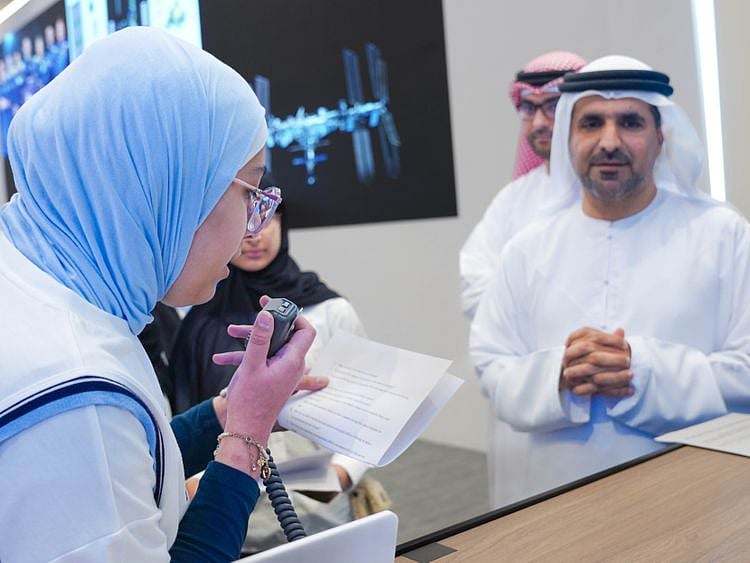HIGHLIGHTS
- The ham radio session was held in collaboration with the Emirates Amateur Radio Society and Emirates Literature Foundation.
- AlNeyadi inspires, educates young participants with a glimpse into his life on the ISS.
Dubai: The Mohammed Bin Rashid Space Centre (MBRSC) in collaboration with the Emirates Amateur Radio Society (EARS) and Emirates Literature Foundation (ELF) arranged the first ham radio session with astronaut Sultan AlNeyadi from the International Space Station (ISS).
The event, held at MBRSC on Tuesday, is the first in a series of 10 ham radio sessions under the ‘A Call with Space’ event.
As part of the ELF in Space initiative, between MBRSC and Emirates Literature Foundation, which aims to bring space closer to the community, 25 students from various schools got the opportunity to connect with astronaut Sultan AlNeyadi. The radio communication between MBRSC and the ISS, was arranged in collaboration with EARS at the Centre’s Ground Station, as the ISS passed over the region.
Ham radio and ARISS
Ham radio, or amateur radio, is a popular hobby that enables communication between individuals, groups, and even remote regions, making it a valuable tool in emergencies. Using a broad spectrum of frequencies, ham radio enthusiasts have the ability to communicate with others locally, internationally and even in space.
Since its inception in the early 20th century, ham radio has not only served as a recreational activity but has also played a crucial role in times of crisis by facilitating emergency communication when conventional networks fail.
The ISS has its own international ham radio programme called the Amateur Radio on the International Space Station (ARISS). It aims to inspire students worldwide to pursue interests and careers in science, technology, engineering, and math (STEM) through amateur radio communications with the ISS on-orbit crew.
ARISS exposes students to life onboard the ISS and helps them explore Earth from space through science and math activities. The programme also raises awareness within the school community about the benefits of human spaceflight and the exploration and discovery that occur on spaceflight journeys.
Student interaction
During the ham radio session, enthusiastic participants from schools in the UAE had the opportunity to ask Al Neyadi questions about the launch, inspiration to become an astronaut, life on the ISS, scientific experiments being conducted, visible changes in climate, as well as memorable experiences and space related activities.
Al Neyadi generously shared his experiences on the ISS, and also spoke about how they communicate on the space station, as well as maintain their physical and psychological health.
In the 10-minute session, Al Neyadi captivated the young audience by providing valuable insights and fuelled the curiosity of the attendees, encouraging them to explore the realms of space further.
On being asked about his favourite activity in space, much to the delight of students, Al Neyadi answered that he, “liked floating in space, like Superman, from one module to the other.”
Sharing the message of the importance of protecting our planet, AlNeyadi mentioned that he was able to understand the value of our planet from space and that it is the responsibility of everyone to protect our resources and preserve the environment.
The UAE Astronaut Programme is one of the projects managed by MBRSC under the UAE’s National Space Programme and funded by the ICT Fund of the Telecommunications and Digital Government Regulatory Authority (TDRA), which aims to support research and development in the ICT sector in the UAE and promote the country’s integration on the global stage.
Scientific, tech hub
MBRSC is an advanced scientific and technological hub, responsible for making the UAE a world leader in space services and exploration.
Established in 2006, the Mohammad Bin Rashid Space Centre (MBRSC) started out with five engineers, who took it upon themselves to develop their capabilities and expand their knowledge in the field of space, relying on strong will and solid determination.
Since then, the centre has continued its journey to be the incubator of the “UAE National Space Programme”. The MBRSC has undertaken the tasks of building, developing, and operating a number of Earth observation satellites, providing imaging services, analysing and studying them, as well as producing relevant data to scientific communities and research centres around the world. Among the satellites that the centre operates are DubaiSat-1 & DubaiSat-2.
The MBRSC is also responsible for KhalifaSat, celebrated as the first satellite that was fully built by Emiratis in 2018. Recently, the centre revealed its plan to develop the new satellite MBZ-SAT, which is expected to be launched at the end of 2023 and to be the latest in the field of high-resolution imaging from outer space.
Sign up for the Daily Briefing
Get the latest news and updates straight to your inbox
Network Links
GN StoreDownload our app
© Al Nisr Publishing LLC 2025. All rights reserved.
